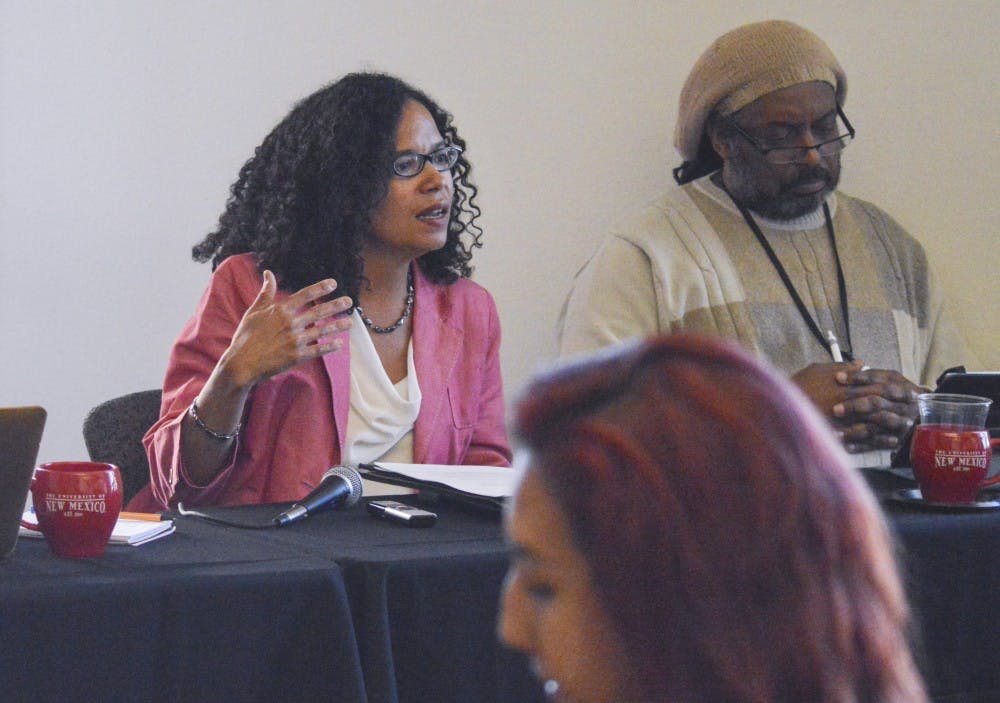The panel discussion on Tuesday, titled “Exclusion Masked as Excellence,” brought together experts from the UNM community, including professors, graduate students and activists, to discuss rules and regulations that have the unintended consequence of limiting the ability of minorities to attend and succeed at UNM.
The event was hosted by OurUNM, the New Mexico Coalition for Equality and Justice, RGSA, Lambda Theta Phi Latin Fraternity, the Project for New Mexico Graduates of Color and ENLACE.
The main topic of discussion was the proposal to raise the minimum grade point average required for college students to receive the New Mexico Lottery Scholarship from 2.5 up to 2.75.
For years the Lottery Scholarship, which is funded by sales of state lottery tickets, has been spending more money than it brings in, and one of the proposed solutions the New Mexico State Legislature has discussed is raising academic requirements for scholarship recipients, speakers said.
The panel speakers believe this will disproportionately affect minority and low income students, who rely more heavily on the Lottery scholarship and would not be able to afford tuition without it.
While much of the discussion focused on issues specific to UNM, many of the speakers talked about the university system in general, and issues of race and privilege that affect society at large.
The discussion also examined the ideas of merit and mediocrity, two concepts the speakers claim were created in order to keep power in the hands of the powerful and prevent minorities and lower income people from improving their status in society.
Doctoral graduate student Virginia Necochea, who focuses on the education system and how it relates to racial issues, spoke at the event.
She discussed how the argument of raising GPA and test score requirements to increase the achievement of students is deeply flawed, because it is based on faulty assumptions.
“(This argument) is assuming that our education system is working fairly and that it is functioning in an applicable way,” she said. “We see the colleges and universities argue that the way to increase excellence at the institutions is by increasing admission requirements such as GPA, test scores, etc. Although research has shown that there is a correlation between GPA, higher test scores and what is considered success at college, we also know that these factors are also associated with family income.”
Santhosh Chandrashekar, another panel speaker, is a graduate student focused on critical race theory and the political economy of the media.
Get content from The Daily Lobo delivered to your inbox
Chandrashekar charged that while UNM is increasing its efforts to recruit international students in an attempt to increase the diversity of the university, it is doing so at the expense of minority groups here in New Mexico, like Native American and African American students.
Chandrashekar also said that the international students who are selected are chosen because they are the most likely to succeed in getting advanced degrees. This boosts statistics that are critical to UNM for its image and for certain funding.
By selecting only the “diverse” students who are most likely to achieve success, UNM is essentially using them to make the University look good, instead of looking out for the interests of the students first, Chandrashekar said.
“My argument is that while international students are slowly becoming an important source of revenue to the University, they also become at the same time critical to how conflicts over excellence and diversity are waged within the universities,” Chandrashekar said. “What we are noticing is a trend where international students are being used in articulation of excellence and diversity in a manner that is poised to pit them against domestic students of color.”
Mike Buttler, a sophomore American studies major, said he walked away from the discussion feeling that universities are becoming more and more like corporations, especially in the way they deal with the issues of race.
He said he feels the idea of mediocrity is a myth, and that many students who achieve more and have an easier time succeeding are able to do so because they were born a certain color, or because their families have more money.
“(Universities) are pitting international students against students of color in the United States, and people should start taking racism as reality,” Buttler said. “We are not post racism. Racism plays out in so many ways. In reality UNM is failing what we consider the people of color in the United States.”
Jonathan Baca is the news editor at the Daily Lobo. He can be contacted at news@dailylobo.com, or on Twitter @JonGabrielB.






